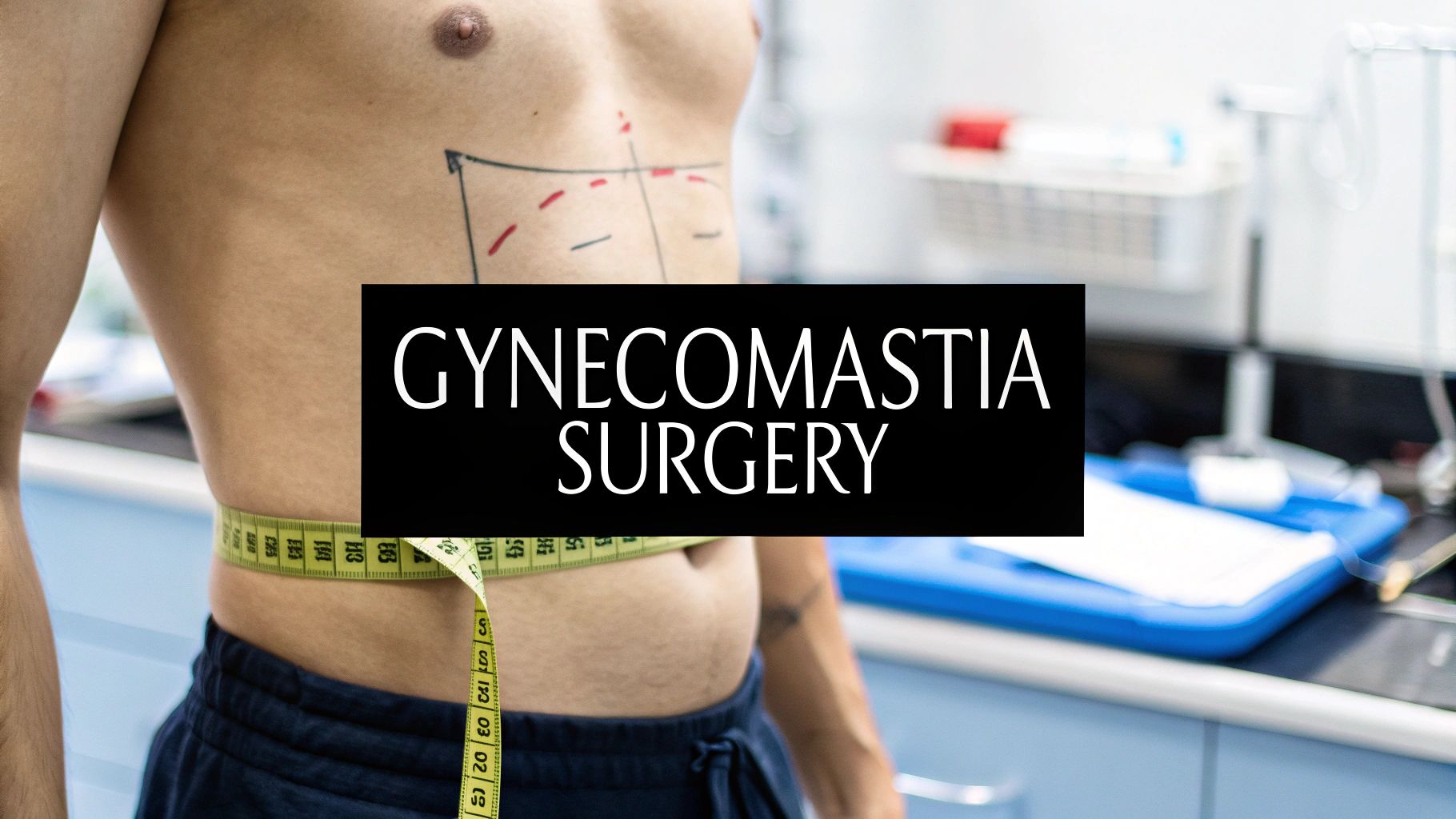
January 19, 2026
What Is Gynecomastia Surgery A Guide to Restoring Chest Contour
Considering what is gynecomastia surgery? This guide explains the causes, surgical techniques, recovery process, and how to choose the right surgeon for you.
Oct 18, 2025

Picking the right surgeon is a huge decision. It's not just about liking their website; it's about digging into their credentials, their specific experience with the procedure you want, and feeling a genuine sense of trust in their approach.
Getting this initial research right is everything. It starts with confirming they're a board-certified specialist, poring over their past work, and making sure their practice works with your insurance. This early homework is what sets you up for a great result.
Finding a great surgeon can feel like looking for a needle in a haystack, but a little structure goes a long way. The real first step isn't just a broad "plastic surgeon near me" search. It's about creating a highly-vetted shortlist based on criteria that absolutely cannot be compromised.
Your focus should be sharp and twofold right from the start: verify qualifications and find a true specialist. This approach saves you from wasting time and emotional energy on surgeons who aren't the right fit. Think of it as setting up a velvet rope—only the most qualified professionals even make it onto your list for consideration.
Before you even think about scheduling consultations, you need that solid list of potential surgeons. This is the foundation. It ensures that every person you eventually meet already clears a high bar for safety and expertise.
Here's a quick summary of what to focus on when you start your search.
These factors aren't just suggestions; they're your essential first filter.
When laying the groundwork for your surgeon search, a critical first step is to thoroughly understand your health insurance coverage and begin by learning about understanding the differences between HMO and PPO plans. This knowledge is crucial as it determines which surgeons are within your network and what your out-of-pocket costs might be.
This infographic shows how to use online medical directories to find qualified surgeons in your area.
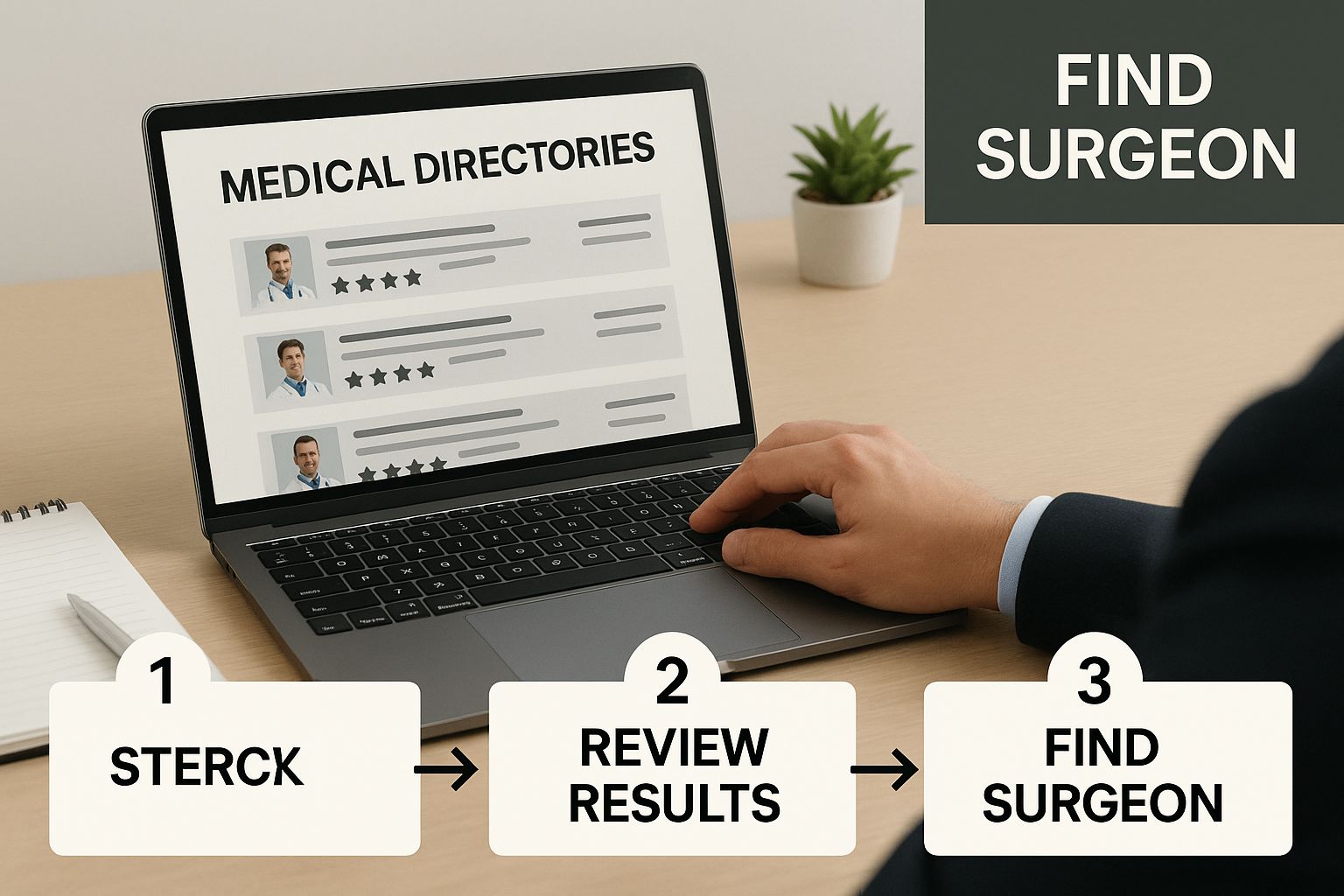
Starting with these core filters helps you efficiently narrow the field to only the most promising candidates. For a more detailed walkthrough, you can find more tips in our guide on how to research plastic surgeons. This systematic approach ensures every surgeon you eventually meet has the fundamental qualifications for your safety and success.
Medical qualifications can feel like an alphabet soup of acronyms and titles, but cutting through that noise is the single most important thing you can do when choosing a surgeon. This isn’t just about glancing at a diploma on the wall. It’s about confirming a surgeon has put in the years of rigorous, specialized training and is held to the absolute highest ethical standards.
Think of it as the ultimate background check for a profoundly important job—the one you're hiring for your own health and safety.
You’ll see the term "board-certified" everywhere, but what does it actually mean? Board certification isn't a given; it's a voluntary and difficult process that shows a surgeon has gone far beyond just getting a medical license. It signals a deep commitment to a specialty, proven by passing incredibly tough written and oral exams.
When it comes to plastic surgery, the only credential that truly matters is from the American Board of Plastic Surgery (ABPS). This is the gold standard. It guarantees the surgeon has completed at least six years of surgical training, with a minimum of three of those years focused entirely on plastic surgery. Be cautious of certifications from other, less rigorous boards—their standards just aren't the same.
You can easily check a surgeon's ABPS status right on their website. It's a quick search that offers incredible peace of mind. For a deeper dive into this, our guide on board-eligible vs. board-certified surgeons breaks down exactly why this distinction is so critical.
After finishing a long residency, the most passionate surgeons often go even further by completing a fellowship. This involves another year or more of hyper-specialized training in a niche area, like aesthetic surgery, intricate craniofacial procedures, or hand surgery.
A fellowship is a huge tell. It shows a surgeon’s desire to become a true master of a specific craft, dedicating extra time to perfect the most advanced techniques. It’s a powerful sign of someone who is deeply committed to their field.
If you’re considering a highly technical procedure—say, a complex revision rhinoplasty or a delicate eyelid lift—a fellowship-trained surgeon can make all the difference. It means they’ve spent concentrated time learning from the best of the best in that exact area.
You don't have to just take a surgeon's word for it. Verifying their license and history is surprisingly straightforward, thanks to public databases. It's a step you should never skip.
Here's where to look:
The path to becoming a certified surgeon in the United States is one of the most demanding in the world, requiring extensive exams and residency training. Yet even with these high standards, the U.S. is expected to have a surgeon shortage of 10,000 to 19,900 by 2036. This projection makes it even more crucial to do your homework. You can discover more insights about these surgical training pathways and what they mean for patients. This due diligence is truly the foundation of choosing a surgeon you can trust without reservation.
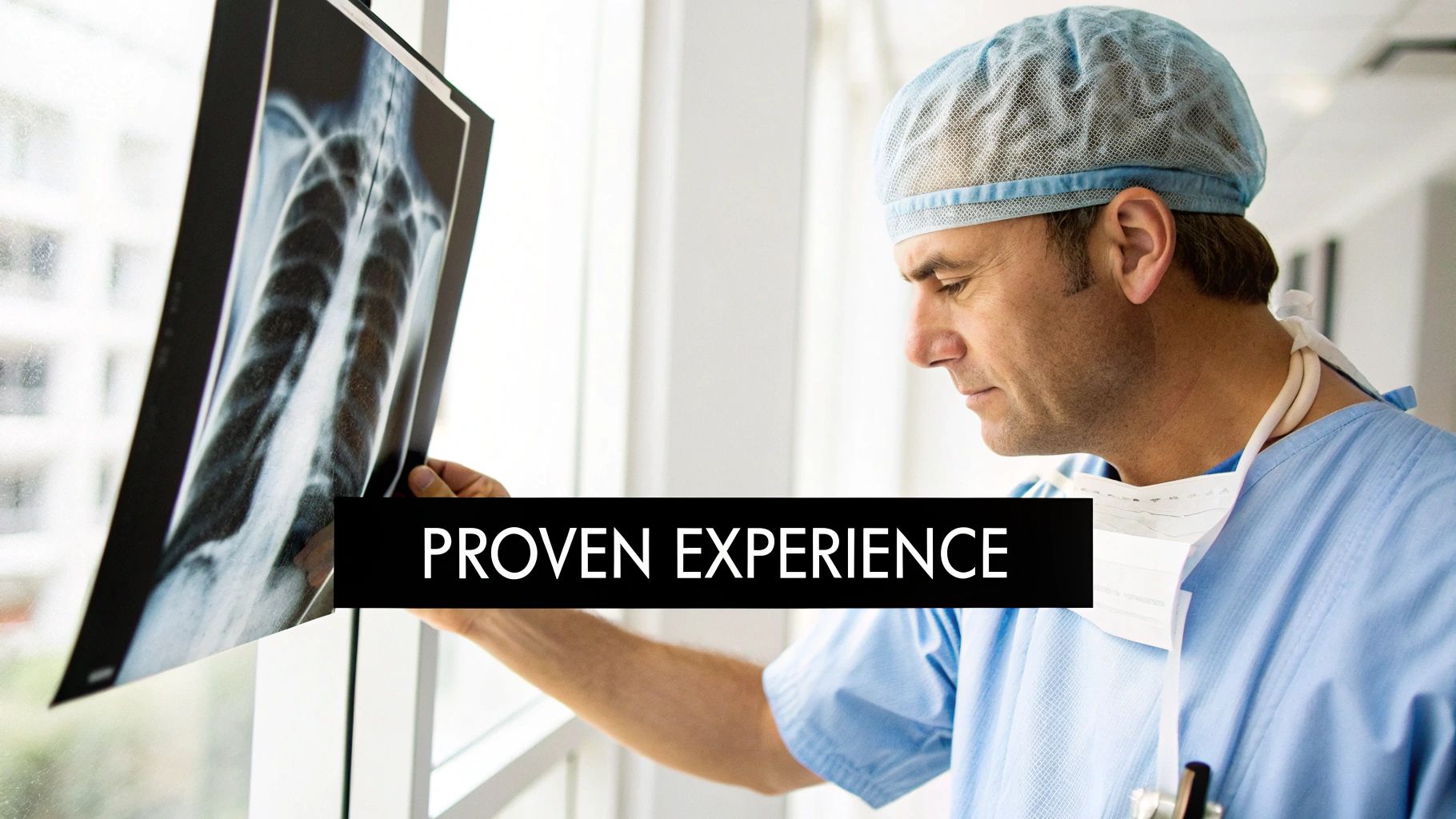
Credentials and board certifications are your starting point—the absolute baseline. But they only tell you a surgeon is qualified on paper. The real story is written in the operating room, procedure after procedure.
You’re not just looking for a good surgeon; you’re looking for a surgeon who is an artist and a master of the specific procedure you want.
Think about it. A surgeon who has performed a particular surgery hundreds—or even thousands—of times has seen it all. They've navigated every possible anatomical curveball and complication imaginable. That depth of experience is what refines technique, sharpens judgment, and leads to consistent, beautiful outcomes. It’s the gap between knowing the steps and achieving mastery.
When you're figuring out how to choose a surgeon, think of it like finding any other highly skilled professional. You wouldn't take a classic Porsche to a general mechanic who mostly works on pickup trucks. You'd find the specialist who lives and breathes that specific engine. Surgery is no different.
A surgeon who dedicates most of their practice to a few core procedures, like breast augmentation or rhinoplasty, develops a level of skill that a jack-of-all-trades simply can't. They aren't just performing the surgery; they are constantly perfecting it.
This is exactly what savvy patients are looking for. A 2022 survey revealed that when people evaluate surgeons, they consistently rank those with focused, procedure-specific experience higher than those with the fanciest degrees or even the longest careers. It confirms what we intuitively know: true specialists deliver superior results. You can read the full research on surgeon selection criteria to see just how much this kind of focused experience matters to patients.
Don't be shy about asking for numbers during your consultation. A confident, experienced surgeon will be transparent about their case volume. Vague answers are a red flag.
When you meet with a surgeon, it's not just appropriate to ask about their experience—it's essential. Your goal is to get a crystal-clear picture of their focus and expertise.
How you frame your questions can make all the difference in getting the answers you need. You want to be direct without being confrontational. Here’s how to approach it:
A truly experienced surgeon will welcome these questions. They see it as a sign of a thoughtful patient who is invested in their outcome. Their answers should feel honest, direct, and reassuring.
A surgeon’s photo gallery is their portfolio. It’s one of the most powerful tools you have, but you need to look at it with a critical eye. Don't just mindlessly scroll—analyze what you're seeing.
Here’s what to zero in on:
This deep dive into a surgeon’s hands-on skill is where you move beyond their resume and into their artistry. It’s how you gauge the real-world technical ability that is absolutely fundamental to making a choice you’ll love for years to come.

Think of the consultation as much more than just a Q&A. It's really your chance to interview the surgeon. This is where you get to see beyond the credentials and degrees on a website and gauge the things that really shape a patient's experience. How do they communicate? Do they listen?
This meeting is your best test for compatibility. You're looking for a genuine partner for your surgical journey, and that partnership needs to be built on trust and clear communication. Walking in prepared is key. For a deeper dive, our guide on preparing for your plastic surgery consultation offers key tips and insights.
Your time with the surgeon is incredibly valuable, so make every minute count. I always tell patients to bring a list of questions—don't be shy about pulling out a notebook or your phone. It shows you’re serious and have done your homework.
A great surgeon will appreciate a well-informed patient.
Focus your questions on three key areas: their specific surgical plan for you, how they handle complications, and what recovery really looks like day-to-day.
Here are a few questions I'd have on my list:
The answers are obviously important, but how they answer is just as telling. A good surgeon can break down complex medical concepts into plain English without making you feel lost. They should be patient and encourage you to ask follow-up questions.
A surgeon's technical skill is non-negotiable, but the connection you feel with them is a massive part of the experience. You have to feel comfortable being completely open about your goals, fears, and questions.
Interestingly, a 2023 nationwide study revealed that a surgeon's bedside manner was the #1 priority for patients when choosing who to go with. That tells you just how much people value the human side of medicine. You can discover more about these patient priorities and see why this connection matters so much.
Your intuition is a powerful tool here. If you feel rushed, ignored, or just plain uncomfortable, that's a major red flag. Don't dismiss that feeling.
This sense of rapport is what a successful surgeon-patient relationship is built on. Without it, the whole process can feel impersonal and stressful.
Pay attention from the moment you walk through the door. How you're treated by the front desk staff, the nurses, and the patient coordinator often reflects the surgeon's own values and standards.
Take note of these things:
All these little details add up to your overall feeling of safety and comfort. A well-run practice with a caring team can make a world of difference in your surgical journey, turning a potentially stressful event into a smooth and positive one.
You’ve done the hard work. After weeks of research, consultations, and poring over photos, you’ve likely narrowed it down to a small handful of surgeons you trust. This is often the toughest part—moving from a list of qualified candidates to the one.
Now, it’s all about bringing everything together. This isn't just about data anymore; it's about weighing the objective facts against your gut feeling. Taking a moment to organize your thoughts methodically is the key to making a choice you’ll feel great about for years to come.
When you have a few excellent options, the details can start to blur. I always suggest patients create a simple comparison chart or even just a pros and cons list. Getting it all down on paper helps you see things clearly and stops one single factor, like a charming personality, from clouding your judgment.
Try scoring each of your top surgeons on a scale of 1 to 5 across a few critical areas:
Laying it all out like this can be incredibly revealing. You might find that the surgeon with the most impressive Ivy League credentials doesn't have a portfolio that resonates with you, while another surgeon’s work consistently hits the mark.
Let's talk about money. It’s a huge part of the decision, but you have to be careful not to just compare the bottom-line number. A suspiciously low price can be a warning sign, potentially indicating corners are being cut on safety, staff, or facility quality.
A proper, transparent quote should always break down the three main costs:
Be skeptical of quotes that are vague or lump everything into one price without explanation. Don’t be afraid to ask direct questions. A great one is, "Does this total include all my pre-op visits, the compression garment I'll need, and my standard follow-up appointments?" You want to avoid any nasty surprises later.
A clear, detailed quote is a sign of a professional and transparent practice.
Finally, after all the logical analysis, it's time to listen to your intuition. Your gut feeling is an incredibly powerful tool. If something feels off, it probably is. Recognizing red flags is your best defense against making a poor choice.
Be on high alert for any of these behaviors:
If you encounter any of this, walk away. No explanation needed. The right surgeon will build your confidence, arm you with knowledge, and treat you as an essential partner in your own surgical journey.
You've done the homework, you've narrowed down your list, but now the real-world questions start popping up. It's totally normal. Moving from research to actually sitting in a consultation room brings up a whole new set of practical concerns.
Let's walk through some of the most common questions that come up when you're on the brink of making this big decision.
Online reviews are a great starting point, but they should never be the final word. Think of them as a way to get a feel for the practice, not necessarily the surgeon's technical skill. They can tell you a lot about the patient experience—things like the friendliness of the front desk staff, how long you're left in the waiting room, and the surgeon's bedside manner.
The key is to look for patterns, not just individual stories. A few glowing five-star reviews or a couple of really scathing one-star rants can easily skew the average. Instead, scan reviews across multiple sites like Google, RealSelf, and Healthgrades. Do you see consistent praise for the surgeon’s ability to listen? Do multiple people mention the amazing follow-up care? That's the stuff that's truly valuable.
Just remember that a review is a snapshot of one person's subjective experience. The final surgical result is deeply personal and can't be judged from a stranger's online post.
My Two Cents: Use online reviews to gauge the office culture and overall patient care. But when it comes to judging a surgeon's actual skill, stick to board certifications, their before-and-after gallery, and your own gut feeling during the consultation.
Then you move on to the next one! It's as simple as that. It is not only okay but highly recommended to consult with more than one surgeon. You should never, ever feel pressured to book a procedure with the first person you meet.
Think about it: meeting with two or three of your top choices is one of the smartest things you can do. Each surgeon will offer a slightly different perspective. One might suggest a technique the other didn't, or you might just find that one doctor's communication style clicks with you on a personal level. This is invaluable information.
Even if you absolutely love the first surgeon, getting that "second opinion" helps validate your choice. It confirms you’ve explored your options and are making a decision you can feel 100% confident about. There's zero obligation.
Price is a tricky one. A high price tag doesn't automatically equal superior skill, just as a low price isn't necessarily a good deal. A surgeon’s fees are a mix of many factors: their reputation, years of experience, the city they practice in, and the overhead of running a high-end facility.
Instead of focusing on the final number, think in terms of value. A board-certified surgeon operating in a fully accredited surgical facility with a board-certified anesthesiologist will naturally cost more. But what you're paying for is a higher standard of safety, experience, and care.
On the other hand, a price that seems too good to be true probably is. A surprisingly low quote can be a massive red flag that corners are being cut somewhere—maybe on staff qualifications, facility safety standards, or the quality of the materials used. Your goal isn't to find the cheapest option; it's to find exceptional care at a fair price. Always put credentials and proven results ahead of the price tag.
Knowing what to look for is only half the battle; knowing what to avoid is just as critical. Sometimes your gut tells you something is off, and it's important to listen to that instinct. I've seen enough over the years to know that certain warning signs should never be ignored.
We've touched on a few of these already, but it helps to have a clear checklist of things that should make you walk away.
Here are some of the most important warning signs that might tell you it's time to look elsewhere.
If you spot any of these red flags during your search, trust your gut. It's a clear sign to thank them for their time and continue looking. Your health and peace of mind are worth it.
At Cape Cod Plastic Surgery, we believe an informed patient is an empowered patient. Dr. Marc Fater and our entire team are dedicated to providing clear, honest guidance and exceptional care every step of the way. If you’re ready to explore your options with a board-certified plastic surgeon who prioritizes your safety and aesthetic goals, we invite you to schedule a consultation.

January 19, 2026
Considering what is gynecomastia surgery? This guide explains the causes, surgical techniques, recovery process, and how to choose the right surgeon for you.
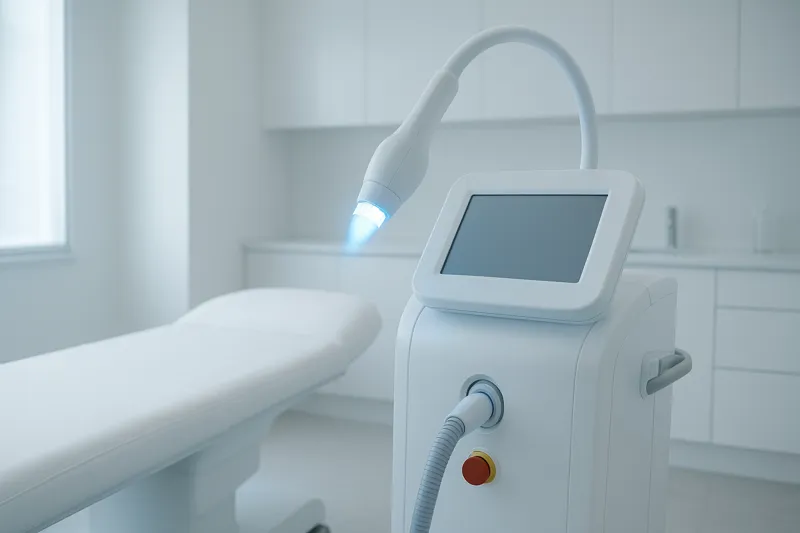
January 19, 2026
Exploring the Advancements and Advantages of Non-Invasive and Laser Cosmetic Procedures
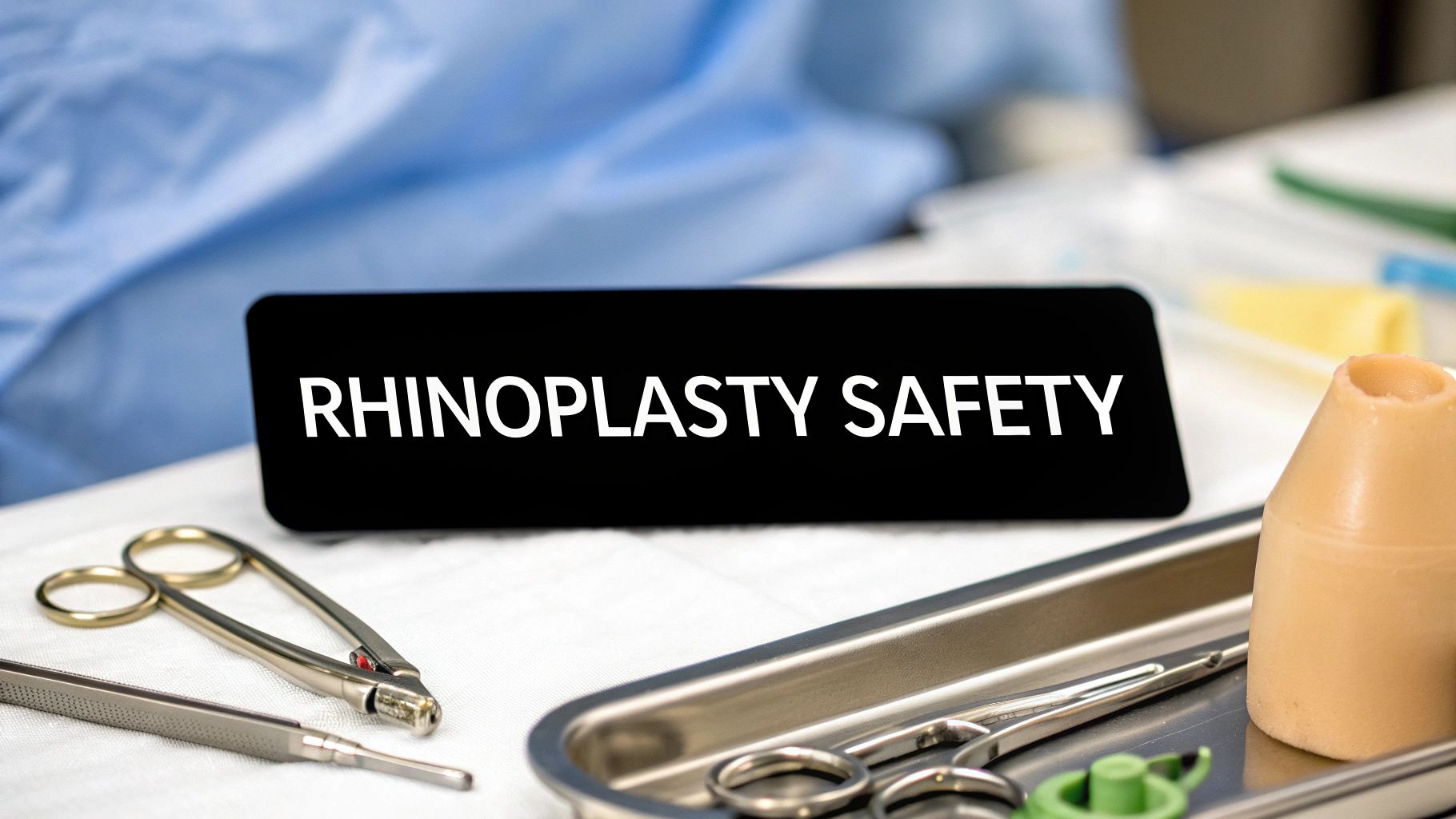
January 18, 2026
Is rhinoplasty dangerous? We answer your question with a clear breakdown of real nose job risks, safety statistics, and how to ensure a successful outcome.